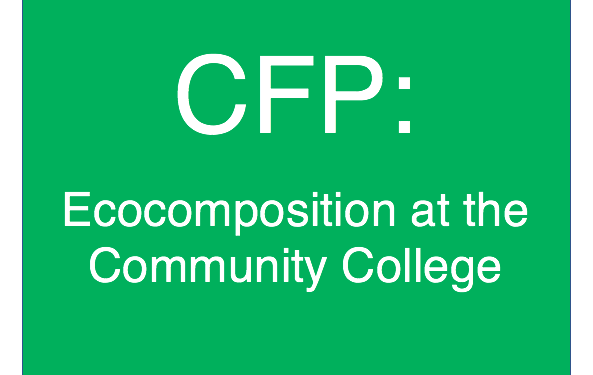
CFP: Ecocomposition at the Community College
Contributions are invited to a proposed volume of essays on teaching ecocomposition at the community college level.
The focus of this volume is the powerful connection between the pedagogical aims of ecocomposition and the pedagogical philosophy of community colleges. Today, all higher education faces a greater push for accountability and relevance, but community colleges in particular are disciplined for degree completion agendas, job readiness, and student engagement/retention. Ecocomposition is ideally suited for high engagement teaching practices like active learning, multimodal learning, service learning, interdisciplinarity, and community outreach. Community college students are in general less wealthy, less privileged, and less prepared than their university counterparts. They are often parents and full-time workers; many speak English as a second or third language. They are the people working “green” jobs in construction industries, sanitation, and landscaping. Their communities are most affected by pollution and smog and traffic. Most of the previous scholarship on ecocomposition addresses the classic first-year composition course at a university level. This volume seeks the insights of community college teacher-scholars who bring ecology, the environment, extreme weather, geology, the Anthropocene, animal studies, ocean studies, gardening, farming, fishing, birdwatching, wilderness, parks, backyards, recycling, sanitation, pollution, toxins, infestations, and/or nature writing into their community college first year composition courses.
Diverse topics and approaches are welcome. Lexington Books has expressed interest in this proposed volume as part of their Ecocritical Theory and Practice series. They require that all contributors have a Ph.D. (If there are multiple authors, at least one must have a Ph.D.)
Diverse topics and approaches are welcome. Lexington Books has expressed interest in this proposed volume as part of their Ecocritical Theory and Practice series. They require that all contributors have a Ph.D. (If there are multiple authors, at least one must have a Ph.D.)
Please submit abstracts and a short CV to Emily Hegarty at Emily.Hegarty@ncc.edu by February 15, 2018. (Complete papers due June 15, 2018.)
MOTOPRESS_5a28a05799aab
